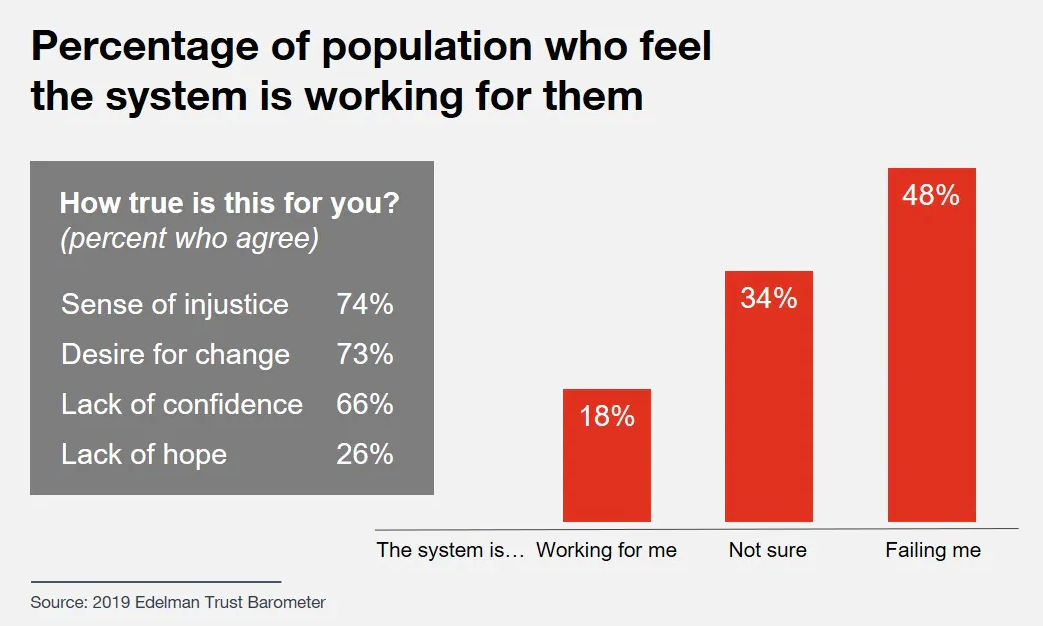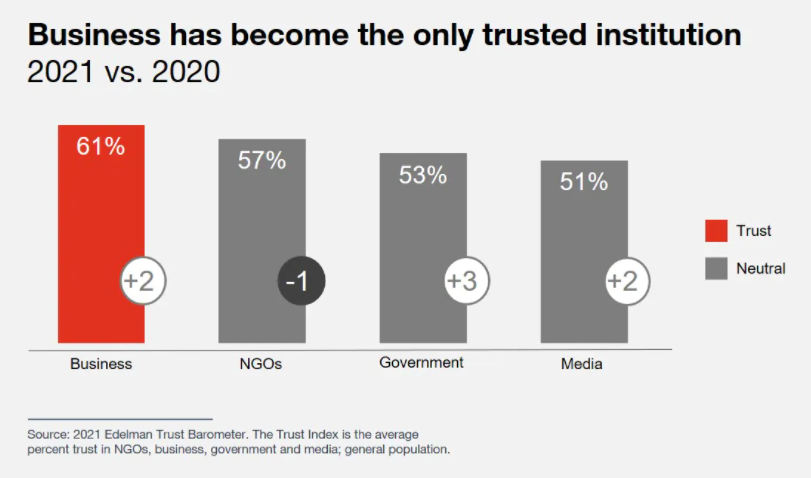Paul DeNicola is a Principal in the Governance Insights Center at PricewaterhouseCoopers LLP. This post is based on his PwC memorandum.
Confidence in the institutions that form the bedrock of society is perilously low. Surveys show that many people have lost faith in government, the media, and the police, among other institutions. Meanwhile, corporations have emerged as leaders. They’re now the most trusted institution in the US according to the Edelman Trust Barometer. Maintaining this trust, and seizing the opportunities it presents, should be a priority for every company.
Of course, there will be challenges as well. Corporate strategy needs to account for this “crisis of institutional legitimacy,” as described by Blair Sheppard, PwC’s Global Leader for Strategy & Leadership, in his book Ten Years to Midnight. It’s one of the most important macro trends facing companies—and the world. As we continue our exploration of the board’s role in setting and overseeing strategy, let’s take a closer look at what directors need to know.
Shifting perceptions
The institutions that were founded to help society function were once seen as “the good guys.” They are essential to creating social stability and for a long time were trusted to provide benefits to society fairly, efficiently, and consistently. Increasingly, that’s no longer the case. Calls for change have become more common and change is needed to keep institutions relevant. However, it is institutions’ inherent slowness to adapt that gives them their stability—and the stability they provide to society—that is at odds with the need to become more agile to better meet the current needs of society. This is the central paradox facing institutions today, and around which companies must operate.

Like the crisis of prosperity and the crisis of technology, which we discussed in earlier editions, the crisis of institutional legitimacy is systemic, and must be addressed by a wide range of stakeholders across society. The challenge for companies, then, is to develop a long-term strategy that takes account of the risks the crisis of institutional legitimacy poses that may affect them. Social disruption is one of the biggest of these risks. Increasing polarization and rising distrust of people of different backgrounds and viewpoints is another.
Doing business as trust declines
What can companies and their boards do when confronted with these difficulties? They should ask how eroding confidence in institutions will affect their business going forward. When faith in government declines, do consumers still give credence to product safety guidance? If fewer families are willing to pay for their children to attend colleges they see as biased, what will the impact on the future workforce be?
In addition, boards may wish to consider how their own company’s actions appear in a world defined by lower trust in institutions. It’s true that many people hold businesses in higher esteem than government, the media, or NGOs. But if companies take trust for granted, that may not always be the case.

The evolving business landscape will present companies with opportunities to continue earning the public’s trust. Take the increasing focus on environmental, social, and governance (ESG) matters, for example. As demands rise for greater transparency around ESG, companies with a clear strategy supported by high-quality disclosure will be more likely to win the confidence of stakeholders.
What the corporate board can do
Here are three areas where it may be especially important for boards to keep the crisis of institutional legitimacy in mind.
- Corporate culture. A company’s culture encompasses the beliefs and often unspoken understandings that influence how managers and employees act. Boards can help make sure the management team is fostering a culture that engenders trust both inside and outside the company.
- Human capital. Trust in companies remains high. That isn’t a given, however. Effective oversight of human capital matters by the board can help ensure that workers continue to feel their employer is on their side.
- Social action. More and more, corporate leaders are taking a stand on key social issues facing the world. When companies weigh in on hot-button issues or seek to influence public policy, boards have an important role to play in ensuring there is a process for evaluating these stances.
 Print
Print